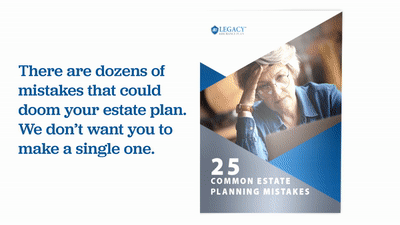Estate planning is a crucial aspect of financial management that many people tend to overlook or postpone. The consequences of procrastination and neglect of this important responsibility can be severe, potentially leading to unintended beneficiaries, legal disputes and significant financial losses. Utilizing and updating legal documents, such as a last will and testament, revocable living trust, powers of attorney and an advance directive, can prevent a host of negative unwanted outcomes ranging from an ex-spouse receiving your life insurance proceeds to an unwanted adult guardianship situation.
Why do people procrastinate on estate planning?

Estate planning procrastination is a widespread phenomenon that affects people across all walks of life. Despite its critical importance, many individuals find themselves delaying or avoiding this essential task due to a complex interplay of psychological, emotional and practical factors.
At the heart of this reluctance lies the profound discomfort many feel when confronting their own mortality. The act of estate planning forces us to acknowledge the inevitability of death, a prospect that can evoke fear, anxiety and even denial. Cultural taboos surrounding discussions of death further reinforce this reluctance, while an optimism bias leads many to believe they have ample time to address these matters later in life. Reframing estate planning as an act of love and responsibility toward one's family, rather than a morbid exercise, can help overcome this significant psychological barrier.
The perceived complexity of the estate planning process presents another formidable obstacle. The array of decisions to be made, the technical legal jargon involved and the fear of making costly mistakes can be overwhelming. Many individuals find themselves paralyzed by the sheer scope of the task, deterred by the perceived time commitment required for proper planning. Education and professional guidance play crucial roles in demystifying the process, breaking it down into manageable steps that feel less daunting.
A persistent misconception that estate planning is only relevant for the wealthy serves as another significant deterrent. Many fail to recognize that everyone has an estate, regardless of its size and that estate planning encompasses more than just asset distribution. It also covers critical aspects such as health care decisions and guardianship for minor children. This misunderstanding often leads people to underestimate the value of their assets and overlook the importance of having a plan in place to ensure their wishes are carried out.
Lack of awareness about the importance of estate planning compounds these issues. Limited exposure to the concept in educational settings or popular media contributes to a general lack of understanding about its critical nature. Many individuals underestimate the emotional and financial stress that a lack of planning can place on their loved ones, particularly when it comes to incapacity planning.
What could happen if your estate plan is outdated?

Neglecting and failing to update your estate plan can have profound and far-reaching consequences that extend well beyond the simple distribution of assets. The ramifications of such neglect can be emotionally, financially and legally devastating for your loved ones and can completely undermine your intended legacy.
One of the most significant risks of failing to maintain an up-to-date estate plan is the possibility of unintended beneficiaries receiving your assets. This scenario can play out in numerous ways, each with its own set of complications. For instance, consider a situation where an individual divorces but fails to update their life insurance policy beneficiary designation. Upon their death, their ex-spouse could receive a substantial payout, potentially leaving their current family in financial distress.
This exact scenario unfolded in the case of Supreme Court case of Egelhoff v. Egelhoff, where a man's children from a previous marriage lost their claim to his retirement benefits because he had not updated his beneficiary designations after his divorce. David A. Egelhoff had designated his wife, Donna Rae Egelhoff, as the beneficiary of a life insurance policy and his pension plan. Mr. Egelhoff died two months after the Egelhoffs divorced – and he had not yet changed his beneficiary designations. The high court argued that a conflicting Washington state law did not pre-empt federal law.
Another grave consequence of neglecting your estate plan is the potential for being forced into an unwanted adult guardianship. Without proper incapacity planning documents in place, such as a durable power of attorney or health care proxy, you could find yourself at the mercy of a court-appointed guardian if you become incapacitated. This guardian may not know your wishes or values and could make decisions about your health care and finances that go against your desires. In some cases, unscrupulous individuals have exploited the guardianship system to gain control over vulnerable adults' assets, leading to financial exploitation and abuse.
Family disputes over inheritance are another common outcome of inadequate estate planning. Without clear instructions, siblings may fight over sentimental items, business assets or real estate, leading to costly legal battles that can deplete the estate and irreparably damage relationships. The case of the late filmmaker John Singleton illustrates this point. His failure to update his will for decades led to a family battle over guardianship when he was incapacitated and subsequent disputes over his estate after his death.
Probate delays and expenses are another significant concern. Without proper planning, your estate may be subject to a lengthy and costly probate process, during which your assets are tied up and your beneficiaries are left waiting. This can be particularly problematic if your heirs rely on their inheritance for immediate financial needs.

Perhaps one of the most personally impactful consequences of neglecting your estate plan is the loss of control over health care decisions. Without an advance directive or health care power of attorney, your family members may be forced to make gut-wrenching decisions about your medical care without knowing your wishes. This can lead to conflict among family members and potentially result in you receiving care that goes against your personal beliefs or desires.
Also, failure to update your estate plan can leave vulnerable beneficiaries unprotected. For instance, if you have a child with special needs, proper planning is crucial to ensure they receive their inheritance in a way that doesn't jeopardize their eligibility for government benefits. Without such planning, a well-intentioned inheritance could actually harm their long-term financial security.
How can life changes impact your estate plan?
Life is dynamic, and significant changes can render your existing estate plan obsolete or ineffective. Major life events that necessitate a review of your estate plan include:
- Marriage or divorce.
- Birth or adoption of children.
- Death of a beneficiary or executor.
- Acquisition or sale of major assets.
- Relocation to a different state.
- Changes in tax laws or estate planning regulations.
Regularly reviewing and updating your estate plan ensures that it remains aligned with your current circumstances and wishes.
What are the most common estate planning mistakes to avoid?

Even when individuals take the initiative to create an estate plan, certain mistakes can undermine its effectiveness. Some common estate planning errors include:
- Failing to update beneficiary designations.
- Neglecting to plan for incapacity.
- Overlooking digital assets.
- Not considering the tax implications of asset transfers.
- Failing to communicate estate plans with family members.
By being aware of these potential pitfalls, you can take steps to avoid them and create a more robust estate plan.
Conclusion
The consequences of neglecting estate planning can be far-reaching, affecting not only the distribution of assets but also healthcare decisions, family relationships and the financial security of loved ones. By understanding the common reasons for procrastination and the potential pitfalls of outdated plans, individuals can take proactive steps to create and maintain a comprehensive estate plan. Regular reviews, especially after significant life changes or legal updates, are essential to ensuring that your legacy aligns with your current wishes and circumstances. Ultimately, a well-crafted and up-to-date estate plan provides peace of mind and protects your loved ones' future, making it a worthwhile investment of time and effort.



